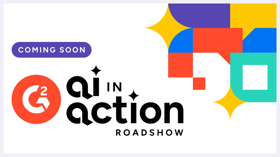May 21, 2025
 by Tanushree Verma / May 21, 2025
by Tanushree Verma / May 21, 2025

Will the art of selling become another casualty of automation?
Not so fast!
As AI tools rapidly transform every aspect of business, the B2B sales landscape finds itself at a critical turning point. With predictions of widespread job displacement and fundamental changes to customer relationships, many sales professionals wonder if their expertise will soon be rendered obsolete.
In this exclusive interview, Stephanie Middaugh, Director of Customer Success at Luster and architect of high-performing sales teams at tech giants like Zoom and WorkRamp, challenges the doomsday narrative with battle-tested insight.
Her message is clear: "The real differentiation will emerge among sales representatives who use AI to enhance their efficiency, maximize productive time, and sharpen their core skills.”
This interview is part of G2’s Q&A series. For more content like this, subscribe to G2 Tea, a newsletter with SaaS-y news and entertainment.
You've been at the forefront of sales enablement across multiple high-growth tech companies. How do you see AI fundamentally changing the way B2B companies sell complex solutions today?
Looking at the big picture, I think we're witnessing a significant pivot toward AI integration across the board. Many organizations are already embracing the "let's just hand it to AI" approach for immediate productivity gains. However, over the coming months and years, I expect we'll see a more nuanced normalization where professionals develop a clearer understanding of when and where AI truly enhances efficiency and productivity.
Right now, possibilities seem limitless. Everyone's discovering they can use AI to summarize communications, personalize content faster, and streamline countless tasks. It's genuinely an exciting period of exploration and innovation.
But I think overall what we're gonna see is AI fundamentally reshaping selling approaches, from research and practice to execution and even documentation.
"AI should function as an extension of human capability rather than a replacement. The art of selling itself can't and shouldn't disappear."
Stephanie Middaugh
Director of Customer Success at Luster
The real differentiation will emerge among sales representatives who are using AI to enhance their efficiency, maximize productive time, and sharpen their core skills. That's precisely where we'll start seeing the tremendous ROI of AI integration within the overall sales process.
Your book “Elevate and Optimize” introduced the Enablement Maturity Model. How is AI challenging or expanding that model, particularly in how sales teams approach discovery and solution design?
So, the idea behind my book, which is around the enablement maturity model, is essentially to guide SaaS and growth startups on their journey from reactive enablement to strategic organizational influence. While AI won't magically mature your enablement function, it can strategically accelerate correlation identification, strategy development, and results delivery.
Today's buyers arrive more educated than ever. They've probably researched you already. They understand the space that you play in. And a sales rep's job then is to come in and kind of fill in those gaps, educate, or ideally tie to pain points and priorities that they're going to have. And that’s where AI should function as an extension of sales representatives — by handling research-heavy lifting so sales reps can dedicate more time to critical thinking, making meaningful connections, and articulating unique value propositions.
Healthy skepticism remains essential when approaching AI. Effective professionals won't simply copy-paste outputs but will apply discernment to refine information. I feel this creates a performance gap between mechanical relayers and thoughtful integrators of AI insights. The uniquely human ability to think critically remains irreplaceable.
"Success comes not from replacement but from leveraging technology to enhance our inherently human capabilities."
Stephanie Middaugh
Director of Customer Success at Luster

Join industry leaders at G2's free AI in Action Roadshow for actionable insights and proven strategies to reimagine your funnel. Register now
With AI's predictive capabilities, how are sales teams recalibrating their understanding of customer intent, buying signals, and decision-making patterns?
When I first encountered AI assistants in my previous role at a database company, I witnessed how they transformed enterprise selling. Sales representatives leveraged AI to analyze quarterly and annual statements, extracting crucial information that previously required hours of manual review. This advancement elevated personalization beyond traditional approaches, where reps could rapidly process research, identify key insights, and precisely align our solutions with prospect priorities.
The AI-enhanced approach enables direct communication, addressing customer pain points, while sometimes even triggering FOMO by highlighting competitive gaps. This dramatically expands how we can personalize prospecting, outreach, and ongoing customer communications.
Though not all sales teams have adopted these methods, they absolutely should. The markets right now are hard, they're difficult, they're challenging. Buyers are not only more educated, as we talked about, but they've also got stricter budgets with everything that's coming down. So they're being incredibly focused on hitting a certain return-on-investment (ROI) metric, key performance indicators (KPI), etc.
Understanding customer priorities and connecting your solutions to measurable outcomes has never been more critical, and AI equips representatives to accomplish this with unprecedented efficiency and precision.
You've built enablement teams at companies like Zoom and WorkRamp. How are AI tools transforming sales training and coaching beyond traditional role-playing and script memorization?
In recent years, the AI conversation at enablement conferences has evolved from wild excitement to a more measured, skeptical approach. What I have noticed is that people recognize AI's potential but aren't always sure how to integrate it effectively into their workflows.
It is a really exciting time for overall skill development for teams. Traditionally, enablement professionals followed a standard process: receive new scripts from marketing, train teams via an LMS, certify reps on messaging, and monitor performance through call recordings or scorecards. However, this approach is often clunky and disconnected from reps' daily reality, reducing engagement and perceived relevance.
I studied to be a teacher when I was in college, and one of the things that we learned pretty early on was that people learn best when they are hands-on with doing things and learning the whole science behind it. While role-playing with managers or peers attempts to address this, these interactions carry inherent limitations — human biases, preconceived notions, and subjective definitions of "good" can hinder objective skill development. AI tools can potentially fill this gap by removing unintentional bias and clearly defining success metrics.
Traditional role plays often feel artificial and unrealistic. AI can simulate authentic customer conversations, generating realistic scenarios while providing immediate coaching recommendations after practice sessions. This creates a safe learning environment before high-stakes customer interactions. Managers can then offer targeted coaching for specific upcoming calls, while enablement teams can identify broader trends and skill gaps.
Rather than hearing vague feedback like "reps need better discovery skills," enablement can precisely identify which discovery components need improvement. This precision allows for highly customized training plans and coaching strategies, moving away from generic training toward prescriptive skill development, which genuinely moves the needle on performance.
Can you share a specific example of how an AI-powered coaching intervention might look different from traditional sales coaching methods?
Traditional coaching typically happens too late in the sales process. Managers review Gong calls in team meetings to discuss what went well and what didn't. Unfortunately, by then, opportunities have already been damaged because representatives have "stepped in the mud" with prospects.
AI-powered coaching offers a transformative approach by providing real-time, one-on-one guidance during practice sessions before calls, not after mistakes have occurred. Additionally, it surfaces targeted coaching recommendations to managers, highlighting specific areas where individual reps struggle and offering actionable improvement strategies.
Many managers unintentionally focus coaching on specific deals or opportunities, creating point-in-time feedback that doesn't translate across customer interactions. This represents a significant opportunity for both managers and enablement teams to shift toward deliberate skill development rather than isolated coaching moments that lack broader application and relevance.
When discussing rep buy-in and development, everything comes down to "what's in it for me?"
"The most compelling value proposition is prescriptive guidance that addresses specific struggles and directly impacts their bottom line."
Stephanie Middaugh
Director of Customer Success at Luster
Sales representatives are motivated by paychecks and quotas, so our approach must focus on making them better performers through targeted coaching that improves overall performance, not just for a single deal.
By using AI insights to identify strengths and efficiency gaps, we can provide precise training and coaching support that drives quota attainment and financial rewards, creating the motivation necessary for lasting skill development.
As a LinkedIn Top Voice in Sales, what are your top three predictions for how AI will reshape B2B go-to-market (GTM) strategies in the next 3-5 years?
We're witnessing a predictable AI adoption curve currently in the initial surge, where organizations apply AI to everything possible simply because they can. In the coming months and years, we'll experience a natural normalization as businesses critically evaluate where AI delivers genuine ROI and where it doesn't, ultimately settling into a more balanced middle ground.
I think that teams and organizations that know how to extract insights properly using AI will start being truly strategic. Rather than relying on guesswork or intuition, these teams will leverage AI's predictive capabilities to precisely identify priorities and align their resources accordingly. This represents a marked improvement over the current landscape, where teams often spread efforts across numerous initiatives, especially in volatile markets. With AI's analytical power, companies can target specific priorities and mobilize their entire organization to execute against precise targets and KPIs.
I also feel there's a lot of talk about AI replacing people's jobs. While concerns persist, the more likely outcome isn't wholesale replacement but a widening performance gap between professionals. Those who master AI as a strategic tool will increasingly outpace colleagues who resist or underutilize these technologies. The most valuable advice is straightforward: learn to leverage AI strategically to enhance productivity, not just for creating training modules or personalizing messages, but for advancing your career, team, and organization. The competitive advantage will come from thoughtful AI applications that move critical initiatives forward, not simply from adoption alone.
Explore the top sales performance management software today!
Follow Stephanie Middaugh on LinkedIn to learn more about sales enablement and how it will reshape the B2B market.
Edited by Supanna Das
Tanushree is an Editorial Content Specialist at G2, bringing over 3 years of experience in content writing and marketing to the team. Outside of work, she finds joy in reading fiction and indulging in a good rom-com or horror movie (only with friends). She is an enthusiastic dancer, a lover of cat reels, and likes to paint. A dedicated Swiftie, Tanushree also has a deep love for Hindi music.
What if mastering artificial intelligence didn't require becoming a technical expert?
 by Tanushree Verma
by Tanushree Verma
AI without orchestration is just noise.
 by Tanushree Verma
by Tanushree Verma
What if mastering artificial intelligence didn't require becoming a technical expert?
 by Tanushree Verma
by Tanushree Verma
AI without orchestration is just noise.
 by Tanushree Verma
by Tanushree Verma


